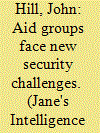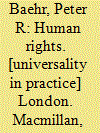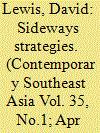| Srl | Item |
| 1 |
ID:
061826


|
|
|
| 2 |
ID:
022777


|
|
|
|
|
| Publication |
Nov 2002.
|
| Description |
10-17
|
|
|
|
|
|
|
|
|
|
|
|
|
|
|
|
| 3 |
ID:
000397


|
|
|
|
|
| Publication |
London, Macmillan, 1999.
|
| Description |
!78p.
|
| Standard Number |
0312221800
|
|
|
|
|
|
|
|
|
|
|
|
Copies: C:1/I:0,R:0,Q:0
Circulation
| Accession# | Call# | Current Location | Status | Policy | Location |
| 041722 | 323/BAE 041722 | Main | On Shelf | General | |
|
|
|
|
| 4 |
ID:
120542


|
|
|
|
|
| Publication |
2013.
|
| Summary/Abstract |
The role of private non-state actors in global governance has focused largely on western actors, notably firms and non-governmental organizations. The rise of new economic powers presents us with an opportunity to consider whether and how the place of non-state actors might evolve. This is particularly true where emerging market firms are concerned, as they are the most obvious manifestation of the shift in economic power away from the developed West and Japan.
The article suggests, however, that the current international system satisfies most of the demands that firms from rising powers might make, so they have little incentive to define their policy preferences in opposition to established powers. They can conduct political activity across a range of avenues, from multilateral institutions to regulatory bodies overseeing technical aspects of business operations.
Indeed, the disaggregation of modern capitalism makes the last route particularly important and attractive for firms. As such, they do not need to frame their policy demands solely - or even mainly - in terms of balancing against western economic dominance.
For non-governmental organizations, the emerging power structure has eroded their previous role of advocates for developing economies. The economic growth of emerging markets has, however, given NGOs an opportunity to work with multinationals in the provision of public goods.
|
|
|
|
|
|
|
|
|
|
|
|
|
|
|
|
| 5 |
ID:
119223


|
|
|
|
|
| Publication |
2013.
|
| Summary/Abstract |
Studying individuals who move from civil society into government in an effort to pursue reform agendas provides important "bottom up" insights into the complexity of policy processes. Using a set of original life history data collected in the Philippines, this article analyses the experiences of such crossover reformist efforts in post-Marcos Philippines in the field of agrarian reform. Taking each of the four governments of the period in turn, a set of themes are discussed including entryism as a political strategy, political patronage, organizational culture, role transitions and activist identities. The article concludes with the idea that the boundary between state and civil society is an important, relatively unexplored area of political activity. By opening up this area as an arena of contentious politics, an ethnographic approach tells us more about the challenges and complexity encountered by those attempting to influence policy processes from the inside, and about the policy process itself as a non-linear phenomenon.
|
|
|
|
|
|
|
|
|
|
|
|
|
|
|
|